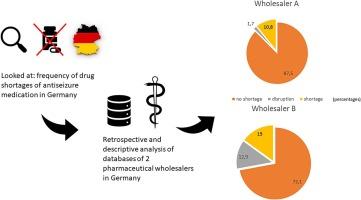Shortage of antiseizure medication in Germany: How big is the problem?
IF 2.3
3区 医学
Q2 BEHAVIORAL SCIENCES
引用次数: 0
Abstract
Objectives
We determined the frequency of drug shortages of antiseizure medication (ASM) availability in Germany.
Methods
Retrospective and descriptive analysis of databases of 2 pharmaceutical wholesalers in Germany with a market share of about 45% of the German market in July 2023 (chosen arbitrarily) focusing on antiseizure drug shortages (i.e. demand could not be met entirely) and disruptions (i.e. demand could not be met at all) on the level of formulations, ASM and of manufacturers.
Results
98/909 (10.8%) of formulations of ASM with Wholesaler A were listed with drug shortages and 131/872 (15%) of formulations were reported with drug shortages at Wholesaler B. 19 of 222 (8.6%) entire ASM at Wholesaler A and 12/213 (5.6%) of ASM with Wholesaler B were reported with drug shortages. 41/62 (66.1%) manufacturers at wholesaler A and 36/57 (63.2%) manufacturers at wholesaler B reported shortages. The three compounds affected most frequently by drug shortages were pregabalin, levetiracetam and carbamazepine. 1.7% (Wholesaler A) and 12.9% (Wholesaler B) of formulations were listed with disruptions.
16.7% (40/239) of ASM with drug shortages/disruptions were brand-name ASM and 83.3% (199/239) were generic ASM.
Conclusions
11% to 15% of ASM formulations had drug shortages in Germany in July 2023. Generic ASM were more frequently affected than brand-name ASM. About 2/3 of manufacturers were reported to have drug shortages.

德国抗癫痫药物短缺:问题有多大?
目的确定德国抗癫痫药物(ASM)可用性的药物短缺频率。方法对2023年7月德国市场份额约为45%的2家药品批发商(任意选择)的数据库进行回顾性和描述性分析,重点分析抗癫痫药物在配方、ASM和制造商层面的短缺(即需求无法完全满足)和中断(即需求根本无法满足)。结果A批发商销售的ASM中有98/909个(10.8%)制剂存在药品短缺,B批发商销售的ASM中有131/872个(15%)制剂存在药品短缺,A批发商销售的整个ASM中222个(8.6%)制剂中有19个存在药品短缺,B批发商销售的ASM中有12/213个(5.6%)制剂存在药品短缺。批发商A的41/62(66.1%)制造商和批发商B的36/57(63.2%)制造商报告短缺。最常受到药物短缺影响的三种化合物是普瑞巴林、左乙拉西坦和卡马西平。1.7%(批发商A)和12.9%(批发商B)的制剂出现了中断,16.7%(40/239)的ASM出现了药品短缺/中断,83.3%(199/239)为仿制药ASM。结论2023年7月,德国有11% ~ 15%的ASM制剂出现药品短缺。仿制ASM比品牌ASM更容易受到影响。据报道,约有三分之二的制造商药品短缺。
本文章由计算机程序翻译,如有差异,请以英文原文为准。
求助全文
约1分钟内获得全文
求助全文
来源期刊

Epilepsy & Behavior
医学-行为科学
CiteScore
5.40
自引率
15.40%
发文量
385
审稿时长
43 days
期刊介绍:
Epilepsy & Behavior is the fastest-growing international journal uniquely devoted to the rapid dissemination of the most current information available on the behavioral aspects of seizures and epilepsy.
Epilepsy & Behavior presents original peer-reviewed articles based on laboratory and clinical research. Topics are drawn from a variety of fields, including clinical neurology, neurosurgery, neuropsychiatry, neuropsychology, neurophysiology, neuropharmacology, and neuroimaging.
From September 2012 Epilepsy & Behavior stopped accepting Case Reports for publication in the journal. From this date authors who submit to Epilepsy & Behavior will be offered a transfer or asked to resubmit their Case Reports to its new sister journal, Epilepsy & Behavior Case Reports.
 求助内容:
求助内容: 应助结果提醒方式:
应助结果提醒方式:


